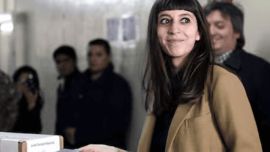Five years ago, Alberto Nisman delivered a bomb into the heart of Argentine politics, justice and international relations. He decided to do it quickly, and of he went on television. He chose TN, the news signal of the Clarín Group, which was at odds with the government of Cristina Kirchner.
The denunciation of an alleged government-led "cover-up" in the case of the AMIA attack, based on a Memorandum of Understanding between the Casa Rosada and Iran unleashed an institutional crisis and on Monday, January 19, 2015, Nisman was to present himself before the National Congress, to expand and document his complaint.
The case of the prosecutor who died in the bathroom of his house does not stop generating passions, operations, polemics and disputes between those who maintain that he was murdered and those who are convinced that the controversial character committed suicide, either by self-determination or induced to do so by some third party.
The great novelty on this fifth anniversary of the explosive denunciation and dramatic end of the official did not come from the courts, the government or even the local media. It was instead a six-part miniseries directed by a British documentary filmmaker, Justin Webster.
The finished product bypasses fanaticism, but records all points of view, offering respect for everyone. It is meticulous. Nor are there, throughout those intense six hours, any low blows or sensationalism. It is an exceptional work. And, on top of that, it's entertaining.
The director of Nisman: The Prosecutor, the President and the Spy sat down for an exclusive interview with Perfil.
In my view, the Nisman case has been and continues to be a theatre of political, judicial and intelligence operations, even at the international level. With everything you know now, do you share this assessment? Did you build your own point of view with so much information? What would it be?
Yes. I have the impression, as Ross Newland of the CIA says towards the end of the series, that the forces against uncovering the truth have been stronger than well-intentioned investigations.
This is the real tragedy. And that the reasons for it are complex. Many are evident in the documentary, it seems to me. Others remain hidden.
I understand that you don't want to enter into the controversy, much less tell its end. But the possibility of suicide by decision, by accident or by induction of someone would not be the end, it would be starting again. [...] Did you make an assessment of how the Nisman case was covered [by the press]?
Media coverage clearly suffered from the politicisation of the case, with noble exceptions. [...] The possibility of having six hours to tell the story, has allowed us to explain the story within the context in which the events happened and weighing the relevance of each element, to then be able to tell it all together.
What conclusion did you reach about Nisman's relationship with spy Antonio "Jaime" Stiuso, and how would you define Stiuso himself, in as much detail as possible?
Without a doubt, Jaime Stiuso has been a very important person in both the AMIA and Nisman cases, and that is why his figure is so important in this story.
The relationship between Nisman and Stiuso is one of the great questions that are generated for the viewer. What was the relationship between them towards the end of 2014, when Nisman was preparing to file his complaint? What was that relationship like between the days when Nisman filed his complaint and turned up dead?
I think Stiuso is still an enigmatic character.
Do you believe Diego Lagomarsino? Has he told the whole truth about his relationship with Nisman?
I think Diego Lagomarsino is someone who has been questioned from the beginning and he held his version [of events]. [...] Without a doubt, and this is something we mentioned in the documentary, Nisman's accounts must be investigated. And it is Lagomarsino himself, also involved in the case investigating these accounts, who says that progress should be made in this investigation.
In the documentary you pay a lot of attention to the calls that Stiuso does not answer to Nisman in the final hours and to the calls crossed by Nisman with other intelligence agents. Why?
Because it's one of the great enigmas of this story. This is, among other things, a "spy story." And there are a series of calls among a large group of spies that follow each other on the day that Nisman stops answering his phone and are suddenly interrupted when he is found dead.
While testimony has been taken from several of the actors in this crossover, the responses do not appear to be sufficient to solve the mystery surrounding them.
Did you receive pressure or feel fearful during the investigation and production?
We didn't receive any kind of pressure from anyone, nor any kind of threat. We did notice the atmosphere of fear around the case and some of the people we talked to did feel threatened or were afraid to talk. [...] We always try to understand the arguments of each side and weigh them responsibly, and then present them to let the viewer judge them for themselves.



















Comments